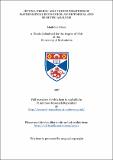Jevons, Debreu and the foundations of mathematical economics: an historical and semiotic analysis
Abstract
This thesis analyses whether the criticism that 20th c economic theory is too abstract, and lacking in economic meaning as a consequence of being mathematical, is justified, from a methodological perspective that is epistemological in character (cf ch2 and Cheix, 1996). Using, firstly the 'external' historical approach, that compares. Economics to the sciences (especially Mathematics chs 5, 6, 7, 8); and, secondly, the semiotic approach, that enquires into the contribution of notation to meaning, the thesis examines the historical and cognitive raison d'etre of mathematics in Economics. The thesis identifies (chs l, 2) 20th c mathematical-economics with model building and neoclassical theory. The main lines of argument are developed with reference to Jevons' Theory of Political Economy and Debreu's Theory of Value. This limitation is practical but not unnecessarily restrictive as the authors are major neo-classical writers, and mathematical economics has developed along the lines they envisaged. Further, neo-classical ideas have established themselves as paradigms of 20th c Economics, and have influenced theories in the social sciences and their mathematization. It is shown that Jevons (ch5) used the symbolism, and in particular, the linearity property of differentials to unify economic theory and the sciences on the pattern of Physics. For him however, the mathematization of economics involved also empirical and experimental inquiries using statistics. For the case of Debreu (ch6) it is shown how he used set-theoretic formalism and fixed point theorems to provide equilibrium theory with logico-mathematical content. This content is viewed as an axiomatic and deductive structure implying equilibrium. The definitions of mathematical economic models discussed in Part 3 show that economics was mathematized through influences not only from Physics, but also from Logic, and, more widely from the 20th c (socio-cultural) trend of model building in science. It is argued that this latter trend is not exclusively, or even necessarily, rooted in neo-classical economics. The semiotic analysis of chs 5 and 6 reveals how notations connect different interpretative levels ('isotopies') of mathematical theories, and how inconsistences may arise between these levels. The general conclusion of the thesis given certain methodological provisos, is that mathematization, in itself, is not a cause of, or explanation for, the emptiness of economic theories.
Type
Thesis, PhD Doctor of Philosophy
Collections
Items in the St Andrews Research Repository are protected by copyright, with all rights reserved, unless otherwise indicated.

